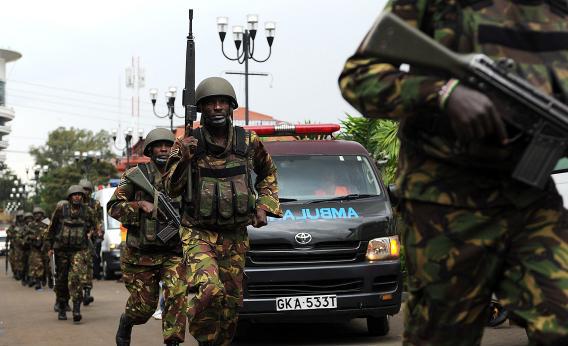It seems hard to imagine in the midst of the ongoing siege at a Nairobi shopping mall that has already killed at least 59 people, but the conventional wisdom on al-Shabab—the al-Qaida linked Somali militant group responsible for the attack—over the past few months has been that it is severely weakened.
Shabab was pushed out of Mogadishu by African Union troops in 2011, and an uneasy calm has reportedly returned to the city. In October of last year, the Kenya Defense Forces and the Somali National Army took control of the Southern port city of Kismayo, Shabab’s last urban stronghold. The area of southern Somalia still controlled by the group has been steadily shrinking since then.
According to an analysis from the Combating Terrorism Center at West Point from late last year, “the militant group has transformed from a Sharia-enforcing body to a weakened band of insurgents. … It has ceased to be a viable political alternative to the Somali government and is moving back to its roots as a local insurgency.” The report suggested that internal divisions related to the group’s decision in early 2012 to declare its allegiance to al-Qaida might be partly to blame for its shrinking influence, along with the military efforts of a number of countries, notably Kenya and Ethiopia.
This line of analysis still seems largely correct despite this weekend’s events. As a law-enforcing political body, Shabab seems to be a spent force. But its weakness within Somalia could actually make it more of an international threat.
Shabab has attacked countries that have participated in military operations in Somalia before, most infamously the attack on World Cup spectators that left 74 dead in Kampala, Uganda in 2010. The group has also been blamed for several attacks in Kenya including the bombing of a Nairobi bus station last year and several grenade attacks on churches. Now that the group’s ability to actually control territory is waning, it seems possible that more of its efforts may be devoted to operations like these. Shabab may start acting more like a transnational terror group than a rebel army fighting to control land.
The efforts of Kenya and its allies over the last two years have dealt a body-blow to Shabab as a viable political force within Somalia, but as the grim images coming out of Nairobi right now, this is not the same thing as reducing the danger it poses outside the country.
